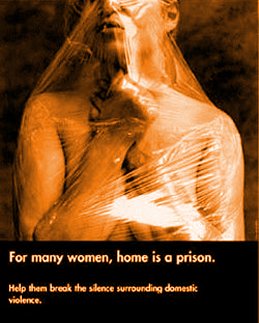Survivors of Abuse
If you've ever been screamed at, humiliated, hit—or know someone who has—you're not alone. Every year, 1 out of every 4 women in America is abused by her partner.
When Susan married her longtime boyfriend, Ulner, in 1989, she never imagined that she'd be included in that statistic. They dated for years before walking down the aisle, and although she says Ulner was overprotective and controlling at times, she says she believed he was the love of her life.
Once they were married, she says things began to escalate at home. Susan says her husband abused her verbally and psychologically nearly every day of their marriage…even when their three children were present. Often, Susan says Ulner made audio recordings of his tirades so that he could listen to them later...
One Sunday afternoon in 2003, Susan says her husband became enraged when she asked him if she could fix him a sandwich for lunch. He went in search of his audio recorder to tape his verbal assault. When he couldn't find it, Susan says he chose the next best thing—a video camera.
Ulner ordered his oldest son, who was 13 years old at the time, to record his tirade. What resulted was 51 minutes of horrifying footage. Susan says her oldest son operated the camera, while her 8-year-old son sat in the room, watching the abuse unfold.
During the first 40 minutes of the video, Ulner screams insults at his wife of 14 years and threatens her with physical violence.
"You play those stupid games with me, I'll knock your teeth out of your face. … I'm going to knock your head across that wall," he tells Susan as their sons look on.
At first, Susan stands silently in the room with her head bowed. Looking back, she says she was trying to come up with a way to calm her husband down. "My mind was racing to find the right answer—to find the answer that was going to make him happy for that second, to appease him so he wouldn't start hitting," she says.
Nothing she says works. Ulner punches, kicks and slaps his wife repeatedly during the final 10 minutes of the video. As he throws her around the room, he demands Susan's obedience. "You've been taught what to say to me, heifer," he says. "You follow what I say to the T."
In all, he calls her "stupid" 23 times and "heifer" 28 times in less than an hour...
The same day the video was shot, Susan made a fateful decision. As she was sitting in a room with her oldest son, her husband gestured toward her. "He looked at my son and he said, 'You see, that. That's the road you're headed down if you don't straighten up,'" Susan says.
With that comment, she says she came to the realization that Ulner could possibly end up killing her. So Susan made the decision to leave...
As Susan fled with her sons, Ulner called her repeatedly, trying to track her down. Police recorded the phone calls to document his violent threats. In one he screamed at her, "If you don't bring my son home, I'm going to kill you, heifer."
After years of abusing his wife, Ulner was finally arrested. At trial, Ulner's behavior shocked the prosecutor, Lisa Bloch Rodwin. "I've never seen such arrogance," she says. "He was making eye contact with the female jurors and trying to look like he was king of the world and that he could control them the way he controlled everybody else. … When he was interviewed by the probation department, he blamed Susan for putting him in this position. But the judge said to him, 'You still don't get it. You have destroyed these children. You have destroyed this woman.'"
In her closing arguments, Lisa played the videotape for the jury one more time. "What I said to the jury is, 'He keeps saying, I have to teach you.' And I asked the jury to teach him."
They did, finding Ulner guilty of 12 counts of assault and two counts of endangering the welfare of a child. The judge sentenced him to 36 years in prison—reportedly the longest sentence ever given for this kind of domestic violence. He's not eligible for parole until 2022...
Abuse comes in many forms—yet it does not have to be as physically violent as this videotape to still be destructive. Sometimes the abuse is emotional control and isolation from family and friends. Other times, it consists of name-calling and humiliation, economic control or threats of violence.
Recognizing the signs of abuse—especially in instances where physical violence is not involved—is not easy, sometimes even for those being abused. Learn the signs of domestic abuse.
If you think you or someone you know is being abused, it's important to tell someone before it's too late.
Call the National Domestic Violence Hotline at 800-799-SAFE to find help in your area.
To go to the original article, click here






